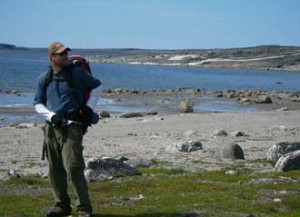
By Cynthia Lee
When it came to exciting research discoveries in 2008, a quartet of McGill scientists blazed the brightest trails. Not only did their work grab headlines worldwide and capture the attention of their peers, it garnered kudos from the prestigious magazine Québec Science. The annual ranking issue, on stands now, features the 10 best discoveries of 2008 selected by a jury of researchers and science journalists.
So, who made the cut? The McGill researchers featured in the magazine include a psychologist, two geologists and a pair of cancer researchers.
Clinical psychologist Dr. Alain Brunet has been investigating post-traumatic-stress disorder (PTSD) for more than 15 years. His breakthrough discovery involves a new use for an old medication, propranolol, the first drug that has the potential to cure PTSD. Propranolol works by partly blocking the emotional component of the trauma memory from being saved again into long-term memory storage while leaving the other components of the memory intact.
Jonathan O’Neil, a PhD candidate and his graduate supervisor Don Francis, Earth and Planetary Sciences, made headlines worldwide by finding the world’s oldest rocks dating back as far as 4.28 million years. The rocks were discovered in the Nuvvuagittuq greenstone belt in Northern Quebec and are believed to be oldest remnants of Earth’s first crust. The discovery may hold a key to our planet’s first billion years.
Leading breast cancer researcher Dr. Morag Park made gains against the disease by showing that the gene profile of certain distinct microenvironments can be used to determine clinical outcomes. By identifying a panel of 26 specific genes, Park’s work continues to advance our understanding of the environment surrounding tumours in the breasts – pivotal to cancer initiation and progression.
Dr. Janusz Rak’s discovery reveals how tumour cells communicate by releasing oncosomes – bubble-like structures that contain cancer-causing proteins. His research goes against the traditional view that a single “mutated” cell will simply multiply uncontrollably to the point of forming a tumour.
“This excellent showing by our researchers and their teams is a source of enormous pride for the entire McGill community,” said Denis Thérien, Vice-Principal (Research and International Relations). “It is precisely these kinds of discoveries and innovations that will be instrumental in re-energizing our economy – yet another reason why supporting research should be of concern to all members of society.”
To learn more about these amazing discoveries: www.cybersciences.com/cyber/fr/magazine/fevrier_2009/retour_au_sommaire.html
